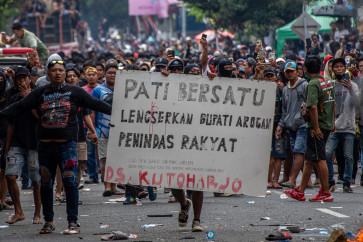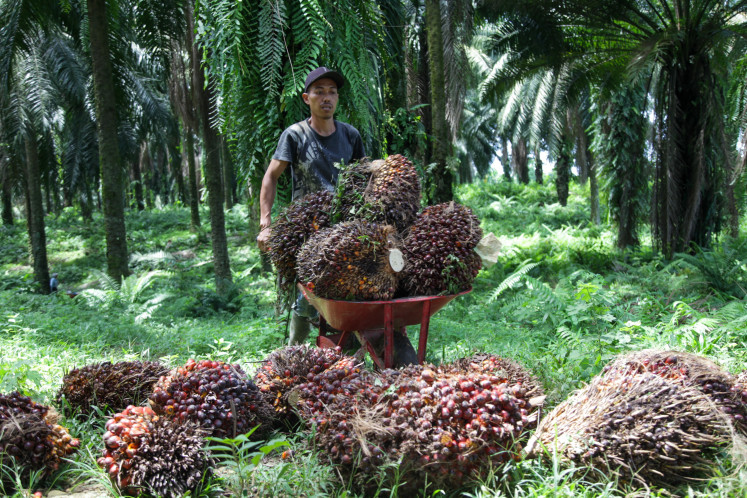Popular Reads
Top Results
Can't find what you're looking for?
View all search resultsPopular Reads
Top Results
Can't find what you're looking for?
View all search resultsSupari's war against New Imperialism
If there were a "National Darling Award" contest, Health Minister Siti Fadilah Supari would probably win it
Change text size
Gift Premium Articles
to Anyone
If there were a "National Darling Award" contest, Health Minister Siti Fadilah Supari would probably win it. Supporters of Supari -- nationalists and ultra nationalists -- praise her as a great third world heroine who dares to challenge the global structure of injustice and inequality perpetrated by powerful states and networks of international institutions.
Most of the praise is based on her opinions detailed in her book Saatnya Dunia Berubah, Tangan Tuhan dibalik Flu Burung, (It's Time for the World to Change, Divine Hands behind Bird Flu).
Just a reminder: it is really important to bear in mind that any decision made to support her would have huge consequences for the public.
There is nothing wrong in arguing that international institutions, despite formal equality and effective mechanisms, are more often than not biased in favor of powerful states and multinational corporations at the cost of poorer countries. There are many cases around the world that show exactly what our minister is worried about.
For example, Indians who for generations used the "neem tree" in medicine, for contraception and in various social roles were disadvantaged and made miserable when U.S. and Japanese corporations tried to extend a patent on the seeds of the "neem tree" to include India, in order to make sure the product trade was not disrupted by "theft" of intellectual property (see Christopher May, 2000, A Global Political Economy of Intellectual Property Rights: the New Enclosures?)
In the case of the neem tree, it was pretty obvious that international institutions such as the World Trade Organization were more in favor of the multinational corporations. Communal property/ ownership and contributions made by the Indian community over the years seemed to be less significant than corporate interests.
Another example is the case of the WTO dispute settlement mechanism versus Indian pharmaceutical companies. Following complaints by the U.S. and the European Union, Indians who had taken advantage of the Indian Patent Act 1970, which did not recognize product patent protection in drugs and food, had to surrender.
In January 2005, India finally bowed to the pressure, and introduced full product patent protection, inclusive of pharmaceutical products. Many have argued the decision was responsible for the subsequent decline in health quality of the poor in India. (See Sudip Chaudhuri, 2005, The WTO and India's Pharmaceutical Industry, Patent Protection, TRIPS and Developing Countries).
However, the problem with Supari is that instead of thinking globally and acting locally, she seems to think and act global, while ignoring many crucial issues in our own backyard.
Looking at her performance so far, it is normal to question whether she has done a lot to create awareness of the unhygienic practices in our community that add to the nightmare that is bird flu. What exactly is her position concerning backyard poultry?
On another health-related issue, what of her stand toward the culture of indulging in unhealthy habits such as smoking? Has she been firm against tobacco company giants? Has she taken any concrete and significant action to deal with tobacco companies in Indonesia, which are indeed a "leviathan" that continues to enrich itself and to sabotage our national goal to create a healthier nation?
Again, there is nothing wrong, and in fact it is actually noble to campaign against new imperialism (if that is what Minister Supari prefers). However, it is misleading to pick up the concept of new imperialism, and to endorse the idea of how dangerous the global empire is today, while at the same time undervaluing and turning a blind eye to some of the less "fashionable" jobs which actually need prioritization at home.
Of course, we hope Minister Supari does not only focus on her bickering with the U.S. and the World Health Organization in her "holy war" against the global "empire", while at the same time leaving the fate of the sufferers in the hands of God, as she says in her book.
In Indonesia we have a famous phrase, "Gajah dipelupuk mata tak tampak, semut diseberang lautan tampak", which more or less translates as: sometimes it is harder to notice an elephant in front of you than an ant across the ocean.
We hope the minister remembers this saying.
The writer holds a bachelor's degree in international relations from the School of Social Science and Cultural Studies, University of Sussex. He can be reached at RN28*sussex.ac.uk.










